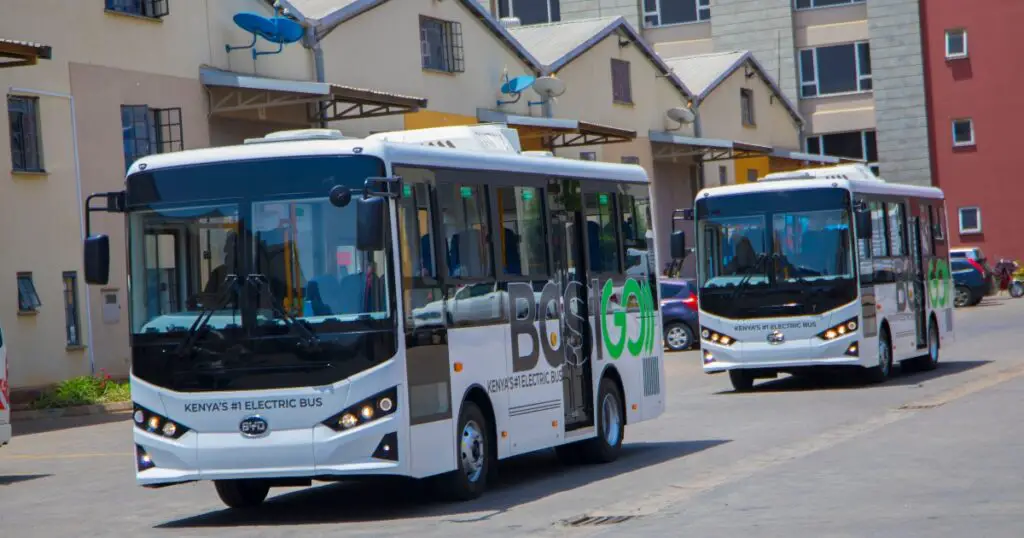- BasiGo has received a $4.3 million Seed funding round, led by Novastar Ventures, to commercialise its electric bus business model and launch a local assembly of electric buses in Kenya
- The company also revealed that it had brought two 25-seat electric buses to Kenya which are currently undergoing performance and reliability testing in Nairobi
- The company entered the Kenyan market in November 2021, to provide electric buses for purchase by public transport providers
- BasiGo’s aim is to offer Kenyans a more environmentally sustainable solution that is also cheaper to maintain than current diesel buses
BasiGo has received a $4.3 million Seed funding round, led by Novastar Ventures, to commercialise its electric bus business model and launch a local assembly of electric buses in Kenya.
The Kenyan-headquartered company also received funding from several Silicon Valley investors, including Moxxie Ventures, Nimble Partners, Spring Ventures, Climate Capital, and Third Derivative.
The company’s CEO and Co-founder Jit Bhattacharya welcomed the investors, adding that they were highly experienced in rapidly scaling businesses in the market.
“They understand this extraordinary moment of opportunity and urgency as time runs out for the world to make a meaningful impact on climate emissions,” he said.
“With East Africa’s abundant renewable energy, this market can leapfrog to clean, modern electric transit at the exact moment that African cities emerge as the next centre of economic growth. The support and knowledge of this investor group will catalyse BasiGo in its mission to make East Africa a leader in inclusive, sustainable bus transport,” he added.
The company also revealed that it had brought two 25-seat electric buses to Kenya which are currently undergoing performance and reliability testing in Nairobi.
The buses will enter pilot operation with select bus operators in Nairobi beginning in March 2022.
BasiGo also announced that it has they had opened a charging and servicing depot for electric buses next to Nairobi’s Jomo Kenyatta International Airport.
The company said the move would help to dramatically reduce the air pollution and climate-warming emissions originating from Kenya’s diesel buses.
“BasiGo sources electric buses from BYD Automotive, the largest electric bus manufacturer in the world. These buses can travel 250km on a single charge and offer a more modern and comfortable passenger experience than current diesel buses in Nairobi including USB Charging and WiFi connectivity for all passengers.”
Meaningful partnerships
Commenting on their investment, Sapna Shah, Partner at Novastar Ventures said they were looking forward to supporting the team’s vision to transform the public bus transport sector in Africa.
“Our investment will accelerate the adoption of electric buses through an innovative finance model, leading to a vastly improved experience for commuters as well as better air quality in dense urban neighbourhoods”, Shah said.
Alex Roetter, General Partner at Moxxie Ventures said confronting the climate crisis and building a sustainable business to help catalyse the electrification of transportation across Africa is an extraordinary opportunity.
BasiGo has the vision and an exceptionally talented team to meet this challenge head on, and Moxxie is thrilled to support their critical mission.”
The company said the funds would assist them to also launch sales and delivery of its electric buses this year, as well as local assembly of its electric buses here in Kenya.
BasiGo will offer electric buses to bus operators here in Kenya through the company’s unique “Pay-As-You-Drive” financing solution, which enables public bus owners to purchase an electric bus for the same upfront cost as an equivalent diesel bus.
Through this model, BasiGo plans to deploy over 1,000 locally assembled electric buses in Nairobi over the next five years.
Entering Kenya
The company entered the Kenyan market in November 2021, to provide electric buses for purchase by public transport providers.
BasiGo’s aim is to offer Kenyans a more environmentally sustainable solution that is also cheaper to maintain than current diesel buses.
Prior their launch, the company had already raised KSh 100 million in funding.
When launching the company, the CEO said diesel engines, which are very popular in Kenya, are also a major source of urban air pollution.
The World Health organisation identifies urban air pollution as one of the biggest environmental threats to human health, and greenhouse gases emissions contributing to climate change.
“By comparison, electric buses in Kenya would produce 95% less CO2e emissions since most of the country’s electricity comes from renewable sources such as hydropower and geothermal. Electric buses would also offer transport providers reprieve from the cost of diesel which has risen sharply in the last few months.”
